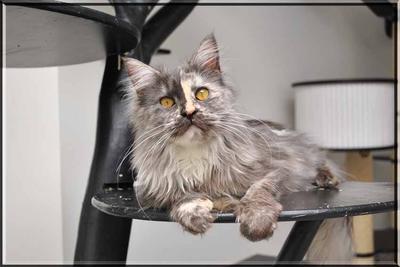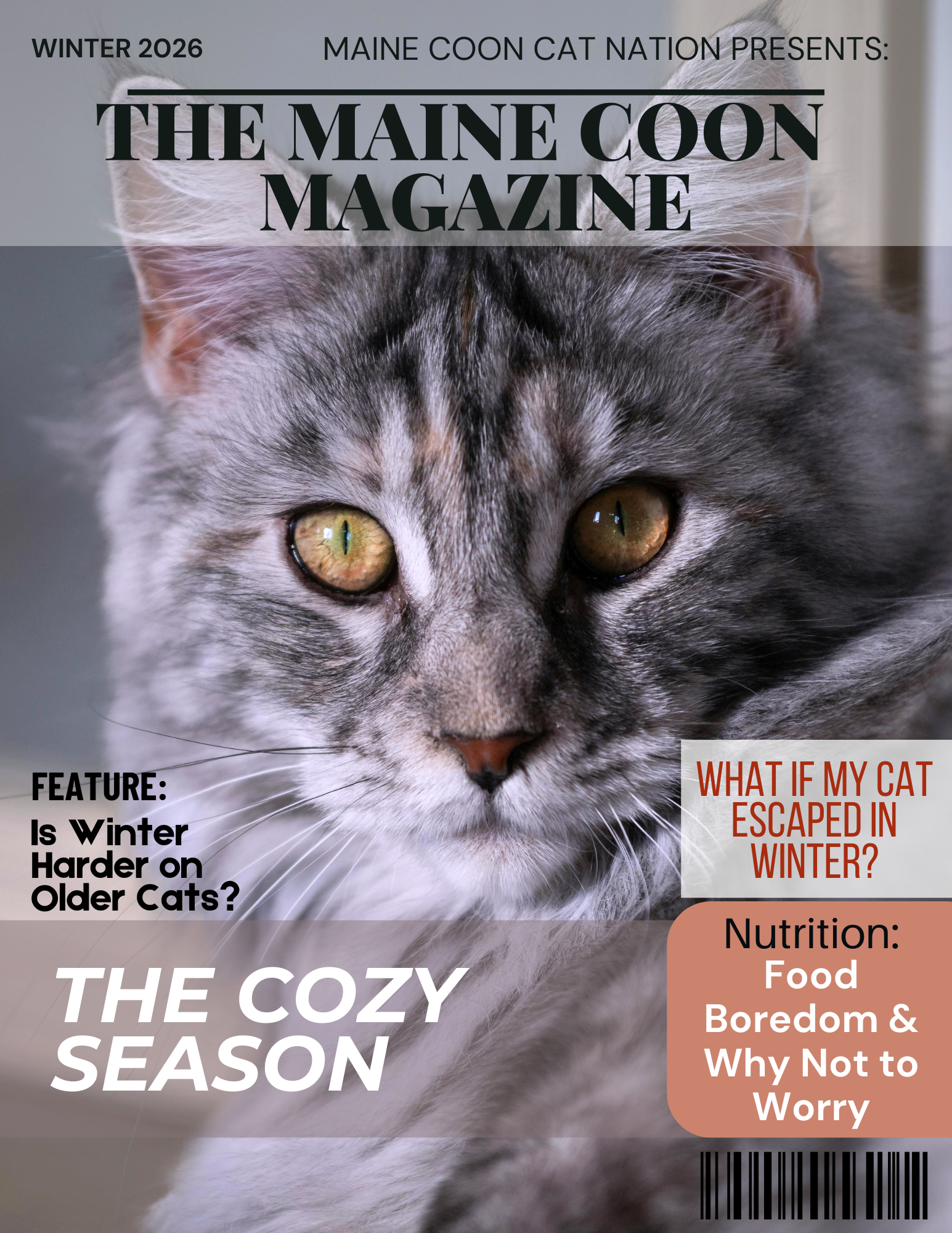- Home
- Maine Coon Cat Health
- Cat Poisons
Cat Poisons And What To Do
Do you worry about cat poisons? This is one of those things most pet parents assume they will never have to worry about, so it stays on the "back burner," so to speak.
If you like this, you'll love our fun, free Daily Digest!

But the danger of pet poisons and household items that are toxic to cats and dogs is very real, and something we should all be not just aware of, but ready to deal with at a moment's notice.
There are so many possible dog and cat poisons that it might not be possible to list them all in one place.
Why It's Important

Once, I entered my kitchen and clearly startled Leo. He was on the island!
I haven't seen him try this in years, and I actually thought he no longer could make that jump.
He had put on a few pounds by that point, and it was quite a feat for such a "stocky" boy.
But clearly, made it up there and was not as trust-worthy as I thought. This led me to reconsider how much trust anyone should put in their pet to stay away from toxic items.
Yes, it's imperative to remove all these offenders from paws reach! Even when it seems that a pet has outgrown such naughty behaviors as chewing on plants or licking empty dinner dishes left in the sink.
Common Hazardous Household Items:
Toxic Plants:
When we talk about plants, we use the word "toxin" instead of "poison." A toxin is a natural substance that can be harmful, but it might not always hurt or kill something because it can range from mild to severe. On the other hand, a poison is more likely to cause harm to something.
Eating plants that are poisonous can make your cat very sick. It might hurt their kidneys or make their heart stop, depending on the plant. If you notice any of these signs, your cat might have eaten something bad, so it's important to call your vet or the closest pet hospital right away.
|
Bonus: |
- Continuous vomiting
- Difficulty swallowing
- Drooling/salivation
- Bloody diarrhea
- Tremors
- Poor coordination when walking
- Elevated or irregular heart rate
- Lethargy
- Weak pulse
- Skin irritation
- Conjunctivitis
Plants to Avoid:
- Lilies (anything with the word lily in it)
- Poinsetta
- Aloe Vera
- Pothos
- Jade Plant
- Snake Plant
- English Ivy
- Sago Palm
- Cutleaf Philodendron
- Dieffenbachia
- Kalanchoe
- Hyacinth
- Oleander
- Lily of the Valley
- Yew
- Tulip
- Daffodils
- Chrysanthemum
- Bird of Paradise
- Peace Lily (bears repeating, for Peace Lily in particular)
Human Foods:
- Alcohol
- Chocolate
- Tea, coffee and energy drinks
- Cheese and milk
- Fat trimmings
- Raw eggs, raw meat and raw fish
- Grapes and their dried forms raisins, sultanas and currants
- Onions, garlic, chives, shallots, leeks and scallions
- Xylitol (can be found in an array of household items, particularly sugarless gums, candies, and toothpastes)
Human Medicines:
You might know that some medicines are used by both people and cats. But it's really important to always talk to your vet before giving your pet any pills. Giving them the wrong medicine or too much can make them very sick, even deadly.
And sometimes, even if the main ingredients in a medicine aren't harmful, there might be other stuff in there that can hurt your pet.
- Antidepressants
- Cancer medicines
- Cold medicines
- Diet pills
- Pain relievers (acetaminophen, aspirin, ibuprofen)
- Vitamins and other supplements
Chemicals and Insecticides:
Keep these items locked away and inaccessible to cats:
- Antifreeze (has a sweet taste)
- Bleach
- Detergents
- De-icing salts (which pets may walk through, then lick from their pads)
- Dog flea and tick medication (pills, collars, spoot-on flea treatments, sprays, shampoos)
- Fertilizers
- Herbicides
- Insect and rodent bait
More Hazards:
These items can choke or strangle cats. If swallowed, they can cause a dangerous blockage:
- Chicken bones
- Dental floss, yarn, or string
- Holiday decorations, including lights and tinsel
- Toys with small or movable parts
Be Prepared:
Post your vet’s phone number in an obvious place, along with the number for the Animal Poison Control Center: (888) 426-4435
|
|
A Not-So-Funny Story:
Although I have had no bad experiences with cat poisons yet, I have had a scare with my dog. And it taught me a couple of lessons. One day, I bought a few groceries in the morning before work.
They were just non-perishables, mostly snacks for school. I left them in the back of the van. (Not the trunk, but the third row was folded down, creating a cargo space.

Later that day, I made the school and sports commute and brought along my Sheltie, Maisy. I put her in the back.
A little while later, at one of the schools, we checked on her to find that she'd opened a bag, then individual boxes of yogurt covered raisins!
She actually ate almost one hundred of those raisins, which are known to be highly toxic to dogs! PS: Don't ask me how I know the number she had eaten!
Well, we rushed home (it was only a five minute drive) and called the vet.
The reason I did this rather than driving straight to the vet was because I had knowledge of what to do and I knew I could provide quicker help that way.
The vet confirmed what I thought, that she needed to vomit right away.
They advised me, we took care of that, and I spoke with them a few more times about her condition and any signs and symptoms to look for and what the time frame would be for her to be "out of the woods." She also went in for blood-work.
Having a Game Plan
There are a few lessons in this story. First, pets can't be trusted! Ever! Second, accidents happen. Everyone forgets something sometime.
And third, if the worst happens - be ready. This means knowing your veterinarians phone number and address immediately.
And just as importantly, or maybe more so, knowing the local emergency clinic's phone number and address before you need it.
If you are in a panic, this is not the time to be online looking up addresses and phone numbers. So, here is some homework for today: put the contact info for both on your refrigerator right now. As well as the hotline for pet poison control.
The ASPCA website has a poison control center, with a hotline to call. There is a consultation fee to call. You can visit their website to browse lists of toxins, including many plant species.
For larger emergencies like fires or floods, see our natural disaster safety guide.
What To Do If You Suspect Your Cat Has Been Poisoned

Stay calm. Collect any evidence of cat poisons- leaves, wrappings, whatever you've found your pet ingesting. (Or suspect he was ingesting.)
This includes anything he may vomit or have been chewing. Keep the evidence (in a sealed bag) in case your vet needs it.
Keep in mind a pet can have no symptoms for hours or even days, but during this time the toxin is being absorbed into the body. So make those calls.
If money is tight, don't resort to asking friends and family for advice, and don't post to forums or websites looking for advice. Your local vet will at least be able to advise you over the phone.
Be ready to provide as much detail as possible. How much you think your pet has ingested, and your pet's breed (more important for dogs) and especially weight.
If there was a container involved (i.e. medications, food wrappers, or household cleaners) have that on hand. You will also need to provide details of the symptoms.
When to Go Immediately To The Vet Or Emergency Clinic:

According to the ASPCA, if your pet is experiencing seizures, difficulty breathing, is unconscious or losing consciousness, this is a time go straight to the vet or clinic.
You'll want to call ahead. If you have your numbers handy and a helper to drive, you can call ahead as you drive away. Otherwise, call from home to let them know you are on your way.
Intentional Cat Poisoning
Sadly, when researching this article I learned that two of the most popular terms used on the internet related to cat poisons are phrases asking how to poison a cat on purpose.
Also, the ASPCA site actually has a page of tips on how to reduce the chances of your pet being poisoned maliciously. What a painful and scary thing to imagine.
This is an appropriate time to mention that the safest place for cats is in the home, unless you have an enclosed outdoor area for them.
So, have a plan in place, phone numbers on hand, and remove as many cat poisons as possible from the home. If the worst should happen, you'll be ready!
« Back to Maine Coon Health

